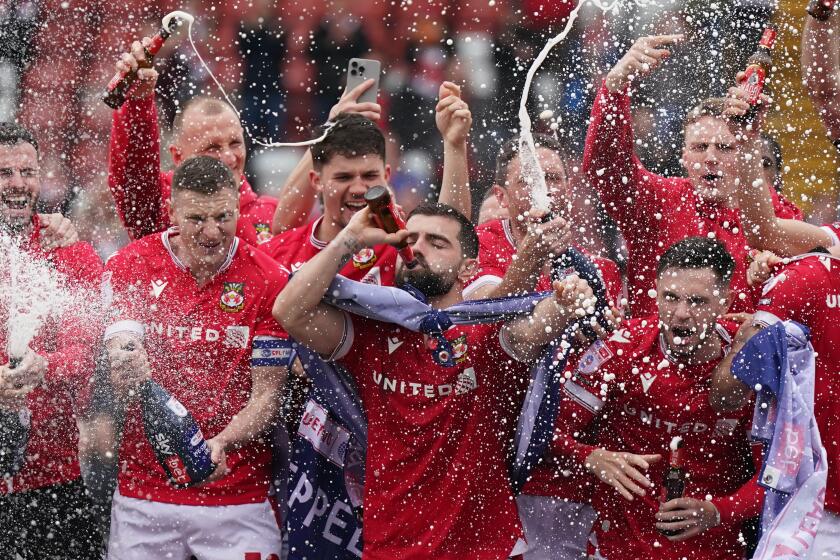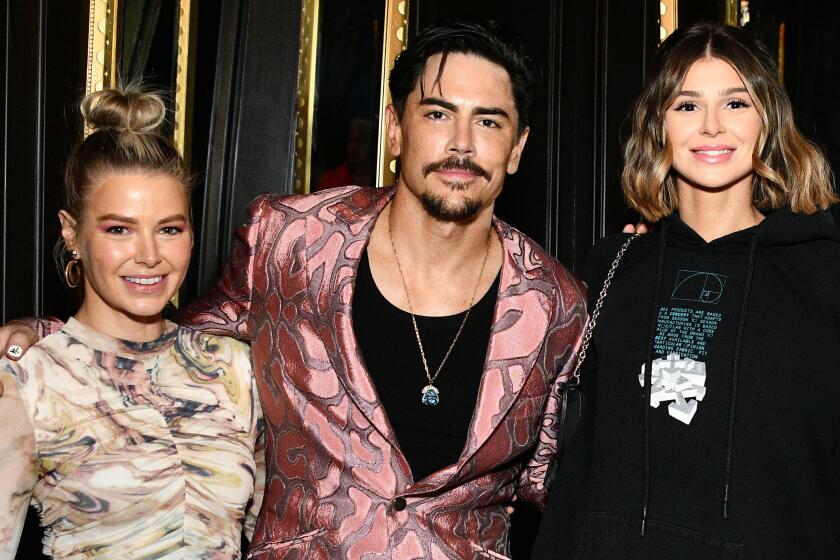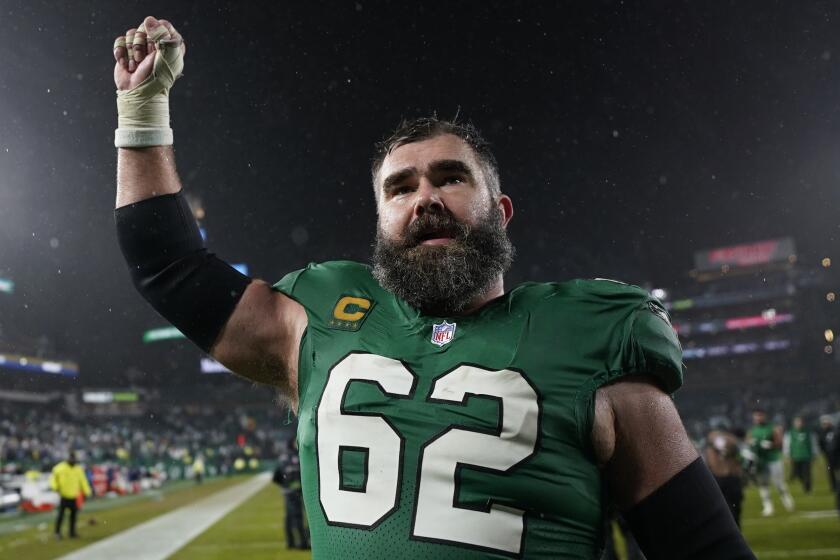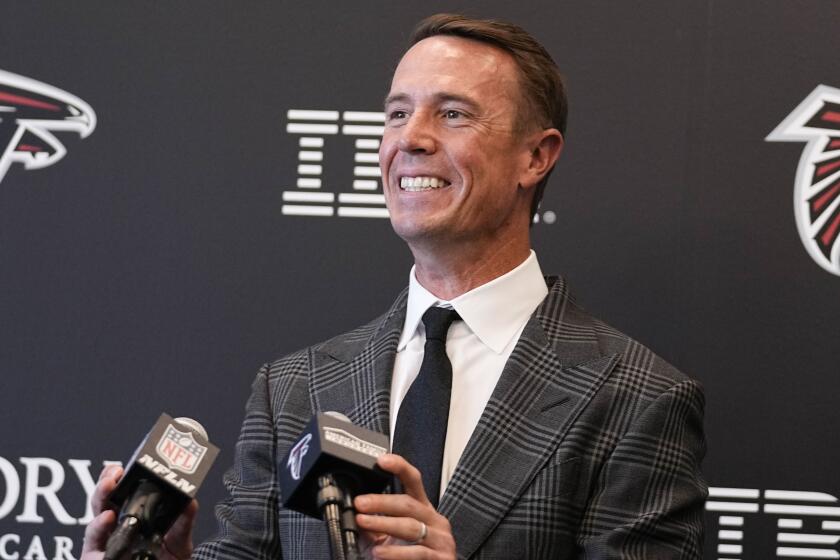No suit, more stubble
Dylan McDERMOTT was standing at the edge of Wonderland Avenue not long ago when a garbage truck came rumbling down Laurel Canyon. The lanky actor was waiting to be photographed in the notorious house where four people were brutally murdered in 1981, a gruesome scar on L.A.’s history examined in the coming film “Wonderland.”
The garbage guy called out to McDermott as he passed by. “Hey, I love your show!” he yelped. “I watch you every Sunday.” McDermott, the intense star of ABC’s “The Practice” for seven years, beamed warmly at his fan. “Thank you, I appreciate that,” he said. “But I’m not on it anymore.”
After the truck rolled out of sight, McDermott turned to a reporter and said with a wry smile, “That’s my audience.”
When you’re an actor with big ambitions, the good news about having a long-running hit TV show on your resume is that everybody knows you. The bad news? Everybody knows you.
At least they think they do.
“Most of America will find out who you are,” McDermott says later, “but if you get pigeonholed in that character, are people going to accept you as anything else?”
That question had been consuming McDermott for years, long before “Practice” uber producer David E. Kelley called him in July to say he was fired from the show. The TV math had been pointing toward that call for a while: By then, McDermott was making too much money and the show too little for things to continue. The Sunday night legal drama had dropped in the ratings after the network switched it to Monday nights opposite the juggernaut “Joe Millionaire” and “Everybody Loves Raymond.” ABC returned “The Practice” to its Sunday slot, but by then the show had been “hammered,” as McDermott puts it. Even before Kelley’s call, he’d cleaned out his dressing room. Also axed were co-stars Lara Flynn Boyle and Kelli Williams as well as several other cast members.
“I was being paid very well, and I knew that with the eighth year coming up, I was going to get another big bump in my salary,” McDermott says. “By the time December rolled around, the writing was on the wall. I knew that probably I was going to go. I didn’t think everybody was going to go.
“I don’t know that I felt betrayed. The television business in general is very cutthroat. You are there for the advertisers. You are feeding that lion every week. I look at it very simply: I had seven years on television, which is unheard of. I feel grateful that I had such a great character to play. The show was so tenuous when it began that I expected to have 13 episodes. I ended up doing 146. So for me, it’s all gravy.”
Still, the 42-year-old actor has been haunted by the specter of a post-”Practice” future toting a yoga mat around Brentwood, a has-been still in his prime.
“Although I have done many films, people identify me with ‘The Practice’ -- the lawyer with the suit and tie, the whole megillah that goes with that,” McDermott says. “So I knew how important it was to do something different. And watching people who have stumbled before me coming out of a television show and trying to have a feature career, it’s a very hard and dangerous thing, because a lot of people don’t have the luck or they’re not accepted, and then years go by and what happened? I had thought long and hard about that transition.”
A little darker side
McDERMOTT is slouching on a sofa in a corner of the Chateau Marmont lobby. He may be touted as a fashion icon (literally a GQ kind of guy, having been a cover boy for the men’s style bible), but in real life he seems far less self-conscious. He’s dressed in nondescript jeans and a T-shirt, and his 5 o’clock shadow is settling in for the long evening ahead.
McDermott’s lack of pomposity quickly impressed people on the set of “Party Monster,” the edgy, recently released low-budget film about drugging divas in disco-era New York. McDermott plays club owner Peter Gatien, who succumbed to crack while running the infamous Limelight. During his first day on the set, he played a particularly dark scene in a hotel room where he was supposed to be smoking crack on a toilet.
“I remember telling everyone to be really respectful and sensitive because he was doing a vulnerable shoot,” says co-director Randy Barbato. “I brought Dylan out and I said, ‘You can look at the monitor and you can see the way we frame it.’ He said, ‘Why don’t you take your pants down and show me how it works?’ He was being fun and sassy. Here was the new guy from Hollywood on the set, and there was this air of apprehension, and Dylan came in, cracked a joke, set everyone at ease and within five minutes he had his pants off and was sitting on the toilet.”
Not a place where one is likely to find brooding, lead defense attorney Bobby Donnell, McDermott’s complicated character on “The Practice.” And if Peter Gatien is a departure from his signature, Golden Globe Award-winning role, McDermott is virtually unrecognizable as the drug-dealing biker David Lind who helped police make a case against porn star John Holmes (Val Kilmer), believed to have facilitated the Wonderland murders. (The movie “Wonderland” opens Friday.)
“People see the movie and they say, ‘I didn’t know you were in it,’ ” McDermott says with obvious pleasure. “Then, like an hour into it, ‘That was you?’ ”
Lind’s girlfriend, Barbara Richardson (Natasha Gregson Wagner), was one of the Wonderland victims. And even though Lind was on the side of the law in this case, he was a pretty savage character himself, bent on revenge against Holmes for duping the house’s inhabitants into opening their door to killers hired by drug major-domo Eddie Nash (Eric Bogosian). Nash was seeking his own revenge after the gang of drug dealers operating out of the Wonderland house broke into his home and robbed him.
McDermott began creating his character physically. “I looked at pictures of David Lind and all those white guys in prison with the Aryan brotherhood. I said, ‘I want that really nasty, gnarly beard, that thing that hangs down so you could twist it and play with it and get some food caught in there,” he says with a laugh.
Drawing on childhood
McDERMOTT added a long, ratty, black wig and skullcap and 13 tattoos. “I wanted to get as [nasty] as I possibly could, and it all seemed to come together in the makeup chair. It was like a bolt of lightning and I knew. Because I had known this guy growing up. The internal world was based on a very specific person, and I was able to tap into that place inside me.”
One of the tattoos had nothing to do with Lind. It’s a heart dedicated to McDermott’s late mother. Because the man the actor saw in the makeup chair was his mother’s late boyfriend, another drug-dealing biker who killed her accidentally while he was cleaning his gun. McDermott was 5 at the time. The boyfriend died a year later.
McDermott politely indicates he’d rather not go into the details, but it’s obvious that the memory stirs strong emotions. His eyes mist over and his voice drops.
“It was the scariest place to go because you don’t want to inhabit that world,” he says. “For better or for worse, this guy had a tremendous influence on me, and I think it took me a long time to realize that. And for me to then use it in a really positive way was the definition of healing, that when you’re able to use something that has hurt you so much, that artistic thing, that’s when you transcend it. That was the beauty of the whole thing.”
On the set, McDermott was low-key about his personal connection to the character. “Wonderland” director James Cox says the actor never mentioned that his portrayal of Lind was fueled by family tragedy.
“We spoke at length about David the human being who walked the Earth, but I always say to actors, ‘You should have your own secrets,’ ” Cox says. “So the exact identity of who David was based on was in Dylan’s mind. Dylan brought to David Lind an honor and a vulnerability and a sensitivity. The character is the sole survivor of the Wonderland gang and he loses the love of his life. So in that sorrow, Dylan was capable of delivering something that was very honest and real and human.”
It would probably surprise a lot of people that the dark souls he’s playing on the big screen these days strike much closer to home for McDermott than the buttoned-up lawyer he’s associated with. As a small child, McDermott lived in a tough part of Waterbury, Conn., down the street from the Rat Pack Motorcycle Club. He remembers Peter Gatien’s face from a poster he passed every day during his feckless youth roaming Greenwich Village, where his father, Mac, was a bartender.
Playwright Eve Ensler (“The Vagina Monologues”) was his father’s third wife and McDermott’s inspiration to become an actor. She adopted him at 19 and, even though she broke up with his dad in 1988, the two remain extremely close. Born Mark, McDermott registered with the Screen Actors Guild as Dylan, the name Ensler had chosen for the son she miscarried.
During his run on “The Practice,” he tried the more conventional path toward a post-Bobby Donnell career: He played handsome leading men in two studio films during summers off, but both efforts failed miserably. “Three to Tango” (1999) was savaged by critics, and Miramax’s “Texas Rangers” disappeared without a trace after a suspiciously delayed release in 2001.
McDermott is clearly not trading on his leading-man looks in either “Wonderland” or “Party Monster,” where he wears an eye patch. While he takes a welcome rest from the intense 14-hour days of television, he’s been relaxing with his family -- actress-wife Shiva Rose and their 7-year-old daughter named after the writer Colette -- and sifting through scripts in search of more meaty character parts. He doesn’t see leading-man roles in his immediate future.
“Most of the good material is going to Tom Cruise and Brad Pitt and all those guys, and by the time it gets to me, there’s a reason those guys aren’t doing it. So if I can then make my move as an actor as a third or fourth lead or a second lead, then that’s a good thing until I’m ready to find the right script that will make me a leading man.
“But right now I think it’s more about the interesting roles, working with good directors, working with good actors. That’s more important to me than trying to get a lead in a studio movie because I think that’s too much pressure nowadays. Eighty to 100 million dollars, and if it doesn’t work ...”
McDermott lets the rest of the sentence, unsaid, hang in the air and smiles.
The complete guide to home viewing
Get Screen Gab for everything about the TV shows and streaming movies everyone’s talking about.
You may occasionally receive promotional content from the Los Angeles Times.



